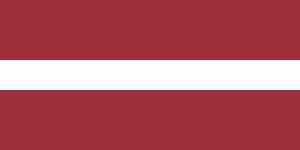Language/Standard-latvian/Culture/Modern-politics-and-society
| ◀️ Major historical events and figures — Previous Lesson | Next Lesson — The conditional mood and hypothetical situations ▶️ |
Latvia is a small Baltic country that has been shaped by centuries of political, economic and social changes. Its modern history starts from the declaration of independence from the Russian Empire in 1918, which was followed by a period of democratic development and achievements in various fields of culture and economy, up until the World War II and the population displacement that followed. After being incorporated into the Soviet Union for 50 years, Latvia regained its independence in 1991 and undertook a complex process of transformation and modernization, becoming a member of the European Union and NATO in 2004.
In this lesson, we will explore contemporary Latvian politics and society, including some of the major challenges and opportunities the country is facing today.
Don't hesitate to look into these other pages after completing this lesson: Latvian nature and national parks & Latvian museums and exhibitions.
Political scene
The Latvian political system is based on a parliamentary republic, where the President is the head of state and the Prime Minister is the head of government. The Parliament consists of one chamber, which is the 100-member Saeima, elected for a period of 4 years.
In recent years, Latvia has experienced significant shifts in the balance of political power, with the rise of new political parties and coalitions that challenge the traditional party structures. In the 2018 Saeima election, the "New Conservative Party" won the majority of seats and formed a center-right government, replacing the previous coalition led by the "Greens and Farmers Union".
Some of the major political issues that Latvia faces today include the relations with Russia, the integration of minority groups such as Russian speakers, the demographic challenge of population decline, and the need for economic growth and modernization.
Economic challenges
Latvia is a small open economy that heavily depends on foreign trade and investments. Its major industries include manufacturing, agriculture, services, and tourism. However, despite significant progress made since the early 1990s, Latvia is still facing some major economic challenges.
One of the main challenges is the need to diversify and upgrade its economy, by investing in innovation, technology, and human capital. Another issue is the high level of income inequality, which affects the well-being of a significant part of the population, especially those living in rural areas and those with low levels of education.
Finally, Latvia is also grappling with the impact of the Covid-19 pandemic, which has severely affected its economy, as well as its social and political stability.
Social issues
Latvia is a relatively small and homogeneous society, with a population of around 1.9 million people. However, it is also a society that has gone through significant changes in the past few decades, especially in terms of its diversity and social cohesion.
One of the main social issues that Latvia faces today is related to the integration of ethnic minorities, mainly Russian speakers, who make up more than a quarter of the population. Despite significant efforts made by the government and civil society organizations, there are still significant gaps in terms of language proficiency, education, and employment opportunities, which can contribute to social exclusion and tensions.
Another social challenge is related to the demographic changes that have been happening in Latvia for several decades. The country is facing a rapidly aging population, declining birthrates, and significant levels of emigration, which can have long-term impacts on the economy, society, and culture.
Interesting facts
- Did you know that Latvia has the highest number of basketball players per capita in the world? Basketball is considered to be the national sport of Latvia, and the country has a strong tradition in the sport, dating back to the Soviet era.
- Latvian cuisine is known for its hearty and diverse dishes, which reflect the country's history and geography. Some of the popular Latvian dishes include potato pancakes, grey peas with bacon, and rye bread.
- Latvia is home to some of the most beautiful natural landscapes in Europe, including the Gauja National Park, the Jurmala beach resort, and the Rundale Palace and Gardens.
We have come to the end of this lesson on modern politics and society in Latvia. I hope you have gained some insight into the challenges and opportunities facing this Baltic country, and learned more about its history and culture. Stay tuned for the next lesson, where we will delve deeper into the Latvian language and grammar!
| Standard Latvian | Pronunciation | English |
|---|---|---|
| Latvija | [latviːja] (LAT-vee-yah) | Latvia |
| parlamenta republika | [paɾlamɛnta ɾɛpublika] (pa(r)-la-MEN-ta re-poo-LEE-kah) | parliamentary republic |
| ekonomikas izaicinājumi | [ɛkɔnɔmiːkas izaʦinaːjumi] (e-ko-NO-mee-kas i-za-TSI-na-yu-mi) | economic challenges |
| sociālie jautājumi | [sɔt͡siɑːlie jau̯taːjumi] (so-TSEE-a-lie yow-TA-yu-mi) | social issues |
| balsskārgums | [balskaːɾgums] (bahlss-KAHR-gooms) | harmony of voices (singing) |
Other Lessons
- Latvian cuisine
- Latvian art and architecture
- Nature and outdoor recreation
- Latvia Timeline
- Major historical events and figures
- Latvian holidays and celebrations
- Latvian language and literature
- Popular sports and events
- Latvian folklore and crafts
| ◀️ Major historical events and figures — Previous Lesson | Next Lesson — The conditional mood and hypothetical situations ▶️ |

